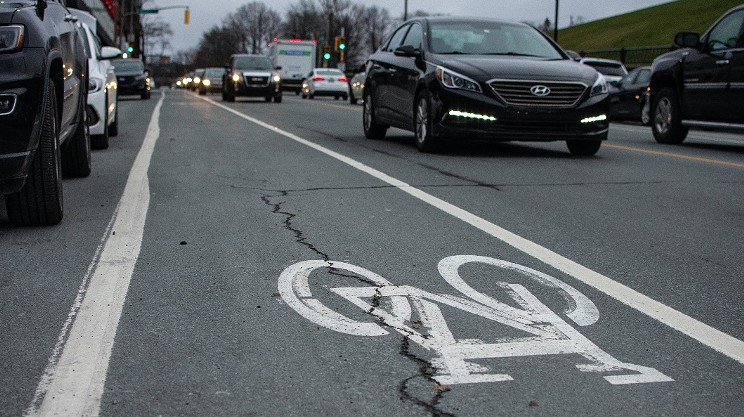“The message that I got was I should be content that I wasn’t killed,” says Stewart Rand.
The Haligonian was hit by a car on the morning of September 30 while riding his bike on the Bedford Highway near Nelsons Landing Boulevard. He says he was thrown into the air by a vehicle that didn’t stop at the stop sign.
“I initially was told two days after the collision that the case would be closed because there was nothing the police could charge the driver with,” he says. “I’m very happy that I was not seriously injured, but I want to ensure that there’s enough of a deterrent in place that it will prevent people from doing it in the future.”
As of October 10, Halifax Regional Police have closed the case and issued a ticket to the car’s driver for “failing to yield to highway traffic when entering a highway,” according to HRP’s public information officer John MacLeod.
But Rand says the police initially weren’t going to issue any ticket to the driver.
“I haven’t gotten an explanation of that change of position from the police,” Rand says. “But the fact that there was any ambiguity around it that tells me that there’s a problem somewhere.”
However, by this time next year, the penalties for drivers who hit cyclists could increase by double.
The new Traffic Safety Act, which had its third reading at the Nova Scotia Legislature on October 11, identifies “vulnerable road users” as a new category of people on the streets. It replaces the current Motor Vehicle Act, which was written in the 1930s.
Section 313 of the new act says that drivers who injure or kill vulnerable road users will face a doubled monetary fine, and will lose their license for a period of time.
According to the act, vulnerable road users include pedestrians, anyone working on or adjacent to highways, emergency services and police working on or adjacent to highways, occupants of tractors, motorcycles, and bicycles.
Vulnerable road users could include occupants of “a conveyance other than a vehicle” or “a person prescribed by the regulations.”
Rand thinks this last category could make the legislation unclear and says Nova Scotians don’t know what the regulations will be when the government enacts the law.
“At this
But Paul Arsenault, director of special projects for Nova Scotia’s Department of Transportation and Infrastructure Renewal, says the specific regulations will allow for easier adaptation as new technologies arise.
“Things have changed so much and things are changing even more rapidly today. We moved a lot of the technical details from the act into the regulations, and that’s important because if there’s something new that comes along, like a new vehicle type, we don’t have to open the Motor Vehicle Act to deal with it,” says Arsenault.
Arsenault explains that things like driverless cars, Segways and three-wheeled motorcycles, which are hard to govern under the current act, will be defined under the new legislation.
“The Motor Vehicle Act, I think it’s fair to say, was written for motor vehicles,” says Arsenault.
“So where we sit today, with the growth in cycling and the desire to get everybody out walking, we needed to develop an act that looks at all road users and thinks about how they interact,” Arsenault says.
Several stakeholders have had input on the new legislature, and Arsenault says the government will continue to seek feedback about the new regulations before they come into effect, which won’t be for about a year.
“They can determine whether or not there might be some additional things they might want us to consider,” Arsenault adds, “This is an act for all Nova Scotians at the end of the day, and the regulations affect everyone so, we need to be mindful of everyone’s concerns.”






















